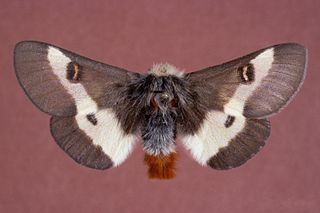
The buck moth is a common insect found in oak forests, stretching in the United States from peninsular Florida to New England, and as far west as Texas and Kansas. It was first described by Dru Drury in 1773. The larvae typically emerge in a single generation in the spring. The larvae are covered in hollow spines that are attached to a poison sac. The poison can cause symptoms ranging from stinging, itching and burning sensations to nausea. Subspecies Hemileuca maia maia is listed as endangered in the US state of Connecticut.
Acopa is a genus of moths of the family Noctuidae. The genus was erected by Leon F. Harvey in 1875.

Aseptis is a genus of moths of the family Noctuidae. The genus was erected by James Halliday McDunnough in 1937.
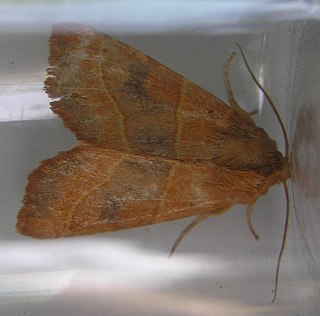
Atethmia is a genus of moths of the family Noctuidae. The genus was erected by Jacob Hübner in 1821.
Zelicodes is a monotypic moth genus in the family Erebidae. Its only species, Zelicodes linearis, is known from the US state of Arizona. Both the genus and species were first described by Augustus Radcliffe Grote, the genus in 1896 and the species in 1883.

Isogona is a genus of moths of the family Erebidae. The genus was erected by Achille Guenée in 1852.
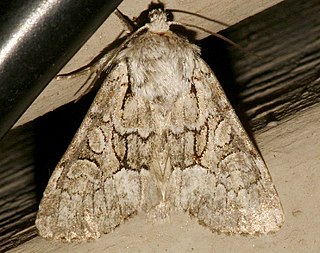
Eremobina is a genus of moths of the family Noctuidae erected by James Halliday McDunnough in 1937.

Feralia is a genus of moths of the family Noctuidae. The genus was erected by Augustus Radcliffe Grote in 1874.
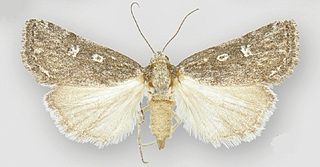
Fotella is a monotypic moth genus of the family Noctuidae. Its only species, Fotella notalis, is found in the US in the Big Bend region of western Texas, southern Arizona, southern California and southern Nevada. The habitat consists of dry deserts. Both the genus and species were first described by Augustus Radcliffe Grote in 1882.

Grotella is a genus of moths of the family Noctuidae first described by Leon F. Harvey in 1875.
Melanomma auricinctaria, the gold-lined melanomma moth, is the only species in the monotypic moth genus Melanomma of the family Erebidae. It is found in the United States and Canada. Both the genus and species were first described by Augustus Radcliffe Grote in 1875.

Oslaria is a genus of moths of the family Noctuidae. the genus was erected by Harrison Gray Dyar Jr. in 1904.

Oxycnemis is a genus of moths of the family Noctuidae. The genus was erected by Augustus Radcliffe Grote in 1882.

Plagiomimicus is a genus of moths of the family Noctuidae. The genus was erected by Augustus Radcliffe Grote in 1873.

Prosoparia is a genus of moths of the family Erebidae. The genus was erected by Augustus Radcliffe Grote in 1883.
Psaphida is a genus of moths of the family Noctuidae. The genus was erected by Francis Walker in 1865.
Stiria is a genus of moths of the family Noctuidae. The genus was erected by Augustus Radcliffe Grote in 1874.
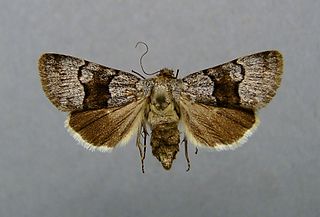
Sympistis is a genus of moths of the family Noctuidae. The genus was erected by Jacob Hübner in 1823.
Tarache is a genus of moths of the family Noctuidae erected by Jacob Hübner. It includes most former New World Acontia species. Lepidoptera and Some Other Life Forms and The Global Lepidoptera Names Index report this name as a synonym of Acontia.
Triocnemis is a monotypic moth genus of the family Noctuidae. Its only species, Triocnemis saporis, is found in the western US states of Washington, Colorado, California and Arizona. Both the genus and species were first described by Augustus Radcliffe Grote in 1881.










